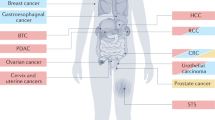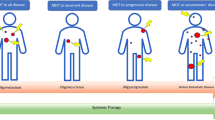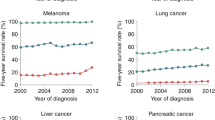Abstract
The fact that local therapy of the primary tumor is futile in the presence of metastatic disease is almost considered axiomatic among oncologists. However, this perception is now being challenged by new laboratory and clinical data. Results from animal models have demonstrated that some primary tumors release factors that enter the circulation which, by mobilizing cells from bone marrow, render distant organs more receptive to metastasis. Clinical observations in renal, breast, and prostate cancer are all consistent with the hypothesis that treatment directed against the primary tumor might retard progression of existing metastases. This hypothesis is amenable to testing by randomized trials of local therapy to the primary site in patients with metastatic cancer.
This is a preview of subscription content, access via your institution
Access options
Subscribe to this journal
Receive 12 print issues and online access
$209.00 per year
only $17.42 per issue
Buy this article
- Purchase on Springer Link
- Instant access to full article PDF
Prices may be subject to local taxes which are calculated during checkout
Similar content being viewed by others
References
Paget, S. The distribution of secondary growths in cancer of the breast. Lancet 133, 571–573 (1889).
Fokas, E., Engenhart-Cabillic, R., Daniilidis, K., Rose, F. & An, H. X. Metastasis: the seed and soil theory gains identity. Cancer Metastasis Rev. 26, 705–715 (2007).
Fidler I. J. The pathogenesis of cancer metastasis: the 'seed and soil' hypothesis revisited. Nat. Rev. Cancer 3, 453–458 (2003).
Psaila, B. & Lyden, D. The metastatic niche: adapting the foreign soil. Nat. Rev. Cancer 9, 285–293 (2009).
Kaplan, R. N. et al. VEGFR1-positive hematopoietic bone marrow progenitors initiate the pre-metastatic niche. Nature 438, 820–827 (2005).
Erler, J. T. et al. Hypoxia-induced lysyl oxidase is a critical mediator of bone marrow cell recruitment to form the premetastatic niche. Cancer Cell 15, 35–44 (2009).
Hiratsuka, S., Watanabe, A., Aburatani, H. & Maru, Y. Tumor-mediated upregulation of chemoattractants and recruitment of myeloid cells predetermines lung metastasis. Nat. Cell Biol. 8, 1369–1375 (2006).
Padua, D. et al. TGFβ primes breast tumors for lung metastasis seeding through angiopoietin-like 4. Cell 133, 66–77 (2008).
Guzvic, M. & Klein, C. A. in Impact of tumor biology on cancer treatment and multidisciplinary strategies (eds Molls, M., Vaupel, P. & Nieder, C.) 117–128 (Springer, Berlin, 2009).
Demicheli, R. et al. Tumor dormancy and surgery-driven interruption of dormancy in breast cancer: learning from failures. Nat. Clin. Pract. Oncol. 4, 699–710 (2007).
McAllister, S. S. et al. Systemic endocrine instigation of indolent tumor growth requires osteopontin. Cell 133, 994–1005 (2008).
Hartford, A. C., Gohongi, T., Fukumura, D. & Jain, R. K. Irradiation of a primary tumor, unlike surgical removal, enhances angiogenesis suppression at a distal site: potential role of host-tumor interaction. Cancer Res. 60, 2128–2131 (2000).
Garfield, D. H. & Kennedy, B. J. Regression of metastatic renal cell carcinoma following nephrectomy. Cancer 30, 190–196 (1972).
Montie, J. E. et al. The role of adjunctive nephrectomy in patients with metastatic renal cell carcinoma. J.Urol. 117, 272–275 (1977).
Silber, S. J., Chen, C. Y. & Gould, F. Regression of metastases after nephrectomy for renal cell carcinoma. Br. J. Urol. 47, 259–261 (1975).
Flanigan, R. C. et al. Nephrectomy followed by interferon alfa-2b compared with interferon alfa-2b alone for metastatic renal-cell cancer. N. Engl. J. Med. 345, 1655–1659 (2001).
Mickisch, G. H. et al. Radical nephrectomy plus interferon-alfa-based immunotherapy compared with interferon alfa alone in metastatic renal-cell carcinoma: a randomised trial. Lancet 358, 966–970 (2001).
Flanigan, R. C. et al. Cytoreductive nephrectomy in patients with metastatic renal cancer: a combined analysis. J. Urol. 171, 1071–1076 (2004).
Tannock, I. F. Removing the primary tumor after the cancer has spread. N. Engl. J. Med. 345, 1699–1700 (2001).
Freed, S. Z. Nephrectomy for renal cell carcinoma with metastases. Urology 9, 613–616 (1977).
Lahn, M. et al. Pro-inflammatory and T-cell inhibitory cytokines are secreted at high levels in tumor cell cultures of human renal cell carcinoma. Eur. Urol. 35, 70–80 (1999).
Ruiterkamp, J. et al. Impact of breast surgery on survival in patients with distant metastases at initial presentation: a systematic review of the literature. Breast Cancer Res. Treat. 120, 9–16 (2010).
Le Scodan, R. et al. Breast cancer with synchronous metastases: survival impact of exclusive locoregional radiotherapy. J. Clin. Oncol. 27, 1375–1381 (2009).
Weckermann, D. et al. Perioperative activation of disseminated tumor cells in bone marrow of patients with prostate cancer. J. Clin. Oncol. 27, 1549–1556 (2009).
Cormen, E., Norton, L & Massagué, J. Clinical implications of cancer self-seeding. Nat. Rev. Clin. Oncol. 8, 369–377 (2011).
Widmark, A. et al. Endocrine treatment, with or without radiotherapy, in locally advanced prostate cancer (SPCG-7/SFUO-3): an open randomised phase III trial. Lancet 373, 301–308 (2009).
Tan, A. & Parker, C. Radiotherapy in locally advanced prostate cancer. Lancet 373, 274–276 (2009).
Engel, J. et al. Survival benefit of radical prostatectomy in lymph node-positive patients with prostate cancer. Eur. Urol. 57, 754–761 (2010).
Acknowledgements
This work was undertaken in The Royal Marsden NHS Foundation Trust, which receives a proportion of its funding from the NHS Executive; the views expressed in this publication are those of the authors and not necessarily those of the NHS Executive. We acknowledge NHS funding to the NIHR Biomedical Research Center. S. C. Morgan was supported by a research fellowship grant from the Canadian Association of Radiation Oncology and Elekta AB.
Author information
Authors and Affiliations
Contributions
Both authors researched data and wrote the article, provided substantial contributions to the discussion of content and reviewed and edited the manuscript before submission.
Corresponding author
Ethics declarations
Competing interests
The authors declare no competing financial interests.
Rights and permissions
About this article
Cite this article
Morgan, S., Parker, C. Local treatment of metastatic cancer—killing the seed or disturbing the soil?. Nat Rev Clin Oncol 8, 504–506 (2011). https://doi.org/10.1038/nrclinonc.2011.88
Published:
Issue Date:
DOI: https://doi.org/10.1038/nrclinonc.2011.88
This article is cited by
-
Development and validation of nomograms for predicting survival in patients with de novo metastatic triple-negative breast cancer
Scientific Reports (2022)
-
Long-term outcomes of prostate radiotherapy for newly-diagnosed metastatic prostate cancer
Prostate Cancer and Prostatic Diseases (2021)
-
The Emerging Role of Local Therapy in Metastatic Prostate Cancer
Current Oncology Reports (2020)
-
Breast cancer
Nature Reviews Disease Primers (2019)
-
Lung cancer cells induce senescence and apoptosis of pleural mesothelial cells via transforming growth factor-beta1
Tumor Biology (2015)



